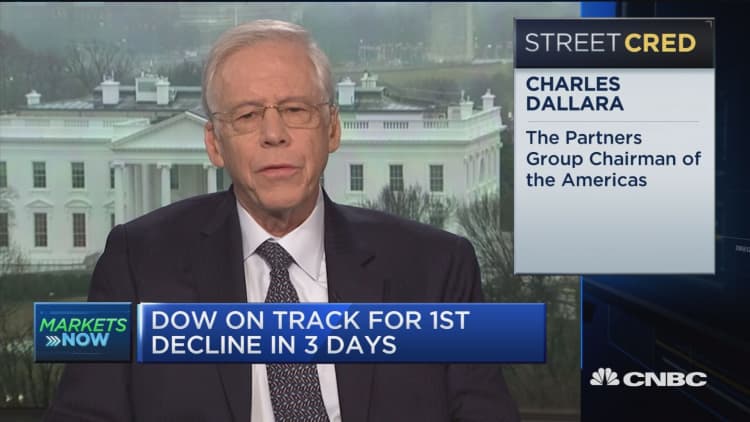Markets have lowered their bar for what kind of U.S.-China trade headlines they'd cheer, a J.P. Morgan Asset Management global market strategist, Hannah Anderson, said Friday.
Markets have been on edge for months about trade tensions between the world's two largest economies. An American delegation led by Treasury Secretary Steven Mnuchin and U.S. Trade Representative Robert Lighthizer is meeting in Beijing this week with Chinese Vice Premier Liu He and his team. Discussions are expected to conclude Friday.
While markets may have at one point hoped for those negotiations to yield a resolution to the ongoing trade war, investors will now be satisfied if Washington simply opts to push back its deadline for additional tariff penalties on China, Anderson said.
"I believe we have seen expectations move from assuming China and the U.S. will resolve their differences during this 90-day negotiating period to assuming that talks would be a success if the U.S. doesn't raise or apply more tariffs on March 1," she said. "This shift reflects how easy it would be for policymakers to move the goalpost and declare victory — and how eager markets, fatigued after a year of trade headlines, are to move trade issues to the back burner."

Asian stocks traded lower Friday following a decline in U.S. stocks overnight after the worst retail sales report since 2009. U.S. stocks, meanwhile, surged on Friday amid increasing hopes for a U.S.-China trade deal.
Earlier in the week, Bloomberg, citing sources, said U.S. President Donald Trump is considering a 60-day extension on the deadline for trade talks before higher tariffs might take effect. The South China Morning Post also reported, citing sources, that Chinese President Xi Jinping is scheduled to meet with the U.S. delegation on Friday.
A Chinese Ministry of Commerce spokesperson would not elaborate on the ongoing trade talks during a regular press conference on Thursday.
The U.S. and China became locked in a trade dispute last year. It began with the Trump administration applying tariffs on $250 billion Chinese goods in an effort to reduce the U.S. trade deficit with the Asian giant. Beijing retaliated with tariffs on $110 billion U.S. goods.
Smaller deals on specific aspects of the larger trading relationship, rather than one deal to resolve all complaints, are likely throughout the year. Markets may have to accept trade headlines are here to stay.Hannah AndersonJ.P. Morgan Asset Management, global market strategist
Within a few months, the discussion on trade focused more on U.S. complaints about how China treats foreign companies, including longstanding economic structural issues and intellectual property rights.
Trump's latest agreement was not to raise tariffs as planned at the beginning of 2019 if both sides could reach a resolution on "forced technology transfer, intellectual property protection, non-tariff barriers, cyber intrusions and cyber theft, services and agriculture" within 90 days, according to the White House.
But the latest media reports about ongoing discussions between both sides in Beijing this week suggest years-long differences will take more than a few months to resolve.
Enforcement is also a major question for China, which has yet to live up to many promises it made nearly two decades ago when it joined the World Trade Organization.
"While it is encouraging that the U.S. seems to be leaning toward giving policymakers more time to reach a settlement, the U.S. delegation appears to be holding firm on its view that greater Chinese purchases of U.S. goods and protection for U.S. intellectual property are meaningless without mechanisms to ensure China lives up to its promises," Anderson said. "China, understandably wary of being tied to too strict of a timeline, has resisted such demands in the past."
"This is not to say a deal is impossible, but the grand bargain the U.S. administration has been angling for remains a long way off. Smaller deals on specific aspects of the larger trading relationship, rather than one deal to resolve all complaints, are likely throughout the year," she added. "Markets may have to accept trade headlines are here to stay."


